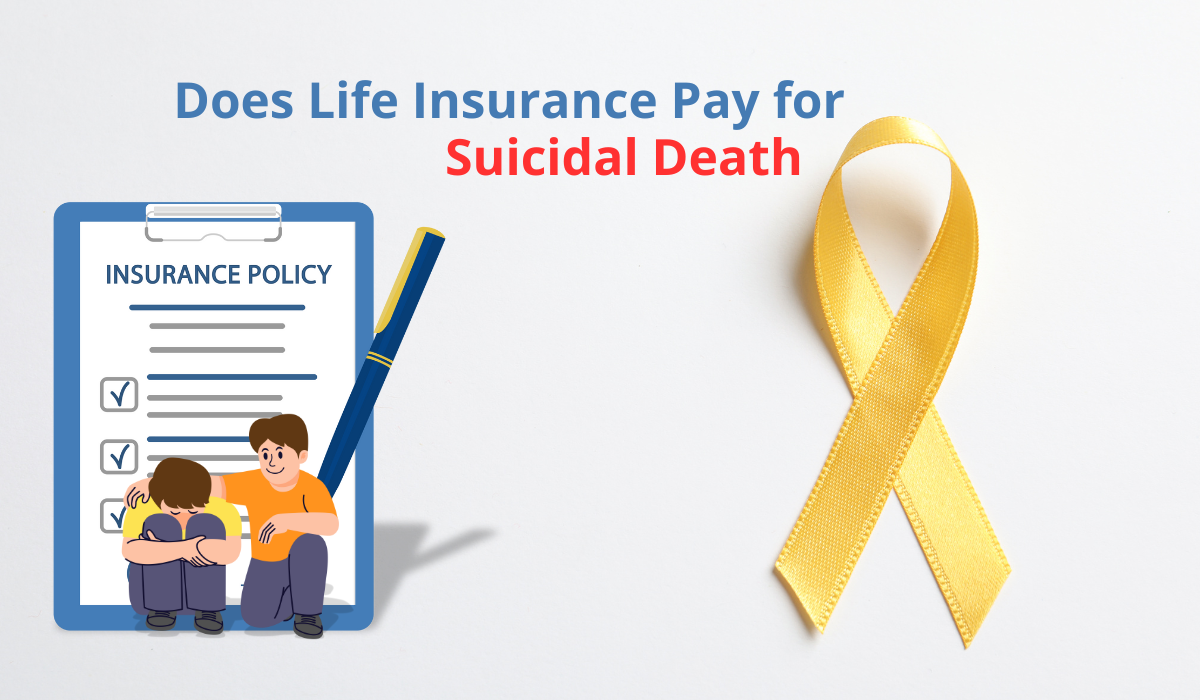Yes, life insurance can pay for suicidal death. However, there are specific conditions and limitations to consider.
Policies often have a suicide clause that may affect the payout. Life insurance is a safety net for many families. It provides financial support after a loved one’s death. But what if the death is due to suicide? This is a sensitive and complex topic.
Understanding the details can be crucial. Many policies have specific terms about suicide. These terms can impact whether or not the death benefit is paid out. Knowing these details can help avoid confusion during a difficult time. We will explore the factors involved in life insurance and suicidal death. This will help you understand what to expect and how to navigate this challenging situation.
Introduction To Life Insurance And Suicide
Life insurance is a crucial aspect of financial planning. It provides peace of mind and security for your loved ones. But what happens if the cause of death is suicide? This topic can be confusing and sensitive. This section will help you understand how life insurance handles suicide cases.
Life Insurance Basics
Life insurance is a contract between you and an insurer. You pay regular premiums, and in return, the insurer pays a sum of money to your beneficiaries when you die. The amount paid is called the death benefit. Life insurance can help cover expenses and provide financial stability for your family.
There are different types of life insurance policies in Missouri. Term life insurance covers you for a specific period, like 10 or 20 years. Whole life insurance covers you for your entire life. Each type has its own benefits and conditions.
Understanding Suicide Clauses
Most life insurance policies include a suicide clause. This clause specifies what happens if the policyholder dies by suicide. Usually, the clause states that if the policyholder commits suicide within a certain period, often two years, the insurer will not pay the death benefit. Instead, the premiums paid are returned to the beneficiaries.
After the exclusion period, the policy generally covers suicide. This means that if the policyholder dies by suicide after the specified period, the insurer will pay the death benefit to the beneficiaries. The exclusion period aims to prevent people from taking out life insurance with the intention of committing suicide soon after.
It’s important to read and understand your policy. Each insurer may have different terms and conditions. Knowing these details can help you make informed decisions about your life insurance.
Suicide Clauses In Life Insurance Policies
Understanding life insurance policies is essential. One crucial aspect is the suicide clause. This clause specifies the terms under which a policy will pay out in the event of suicide. Knowing these details can help you make informed decisions.
Common Terms And Conditions
Life insurance policies often include suicide clauses. These clauses set specific terms and conditions. Here are some common aspects:
- If the policyholder dies by suicide within a specified period, the policy may not pay out.
- Insurance companies may return the premiums paid instead of the death benefit.
- After the specified period, the policy typically pays the full death benefit.
These terms and conditions help prevent fraud and ensure the policy’s integrity.
Duration Of Suicide Clauses
The duration of suicide clauses varies by policy and insurer. Most policies have a standard period:
| Insurance Company | Duration |
|---|---|
| Company A | 2 years |
| Company B | 1 year |
| Company C | 2 years |
During this period, if the policyholder dies by suicide, the policy may not pay the death benefit. After the period ends, the policy usually pays the full amount. Always check your policy details to understand the specific duration and terms.
Waiting Periods For Suicide Clauses
Life insurance policies often include a suicide clause. This clause sets a waiting period before a death by suicide is covered. Understanding these waiting periods is crucial for policyholders and their families.
Typical Waiting Period Lengths
The waiting period for suicide clauses usually ranges between two to three years. During this time, if the policyholder dies by suicide, the insurance company does not pay the full death benefit. Instead, beneficiaries might receive a refund of the paid premiums.
| Insurance Company | Waiting Period |
|---|---|
| Company A | 2 years |
| Company B | 3 years |
It is important to check your specific policy details. Each insurance company may have different terms.
Impact On Policy Payout
If a policyholder dies by suicide within the waiting period, the insurance company usually returns the paid premiums. This means no death benefit is paid to the beneficiaries. After the waiting period, the full death benefit is payable.
- Within the waiting period: Refund of premiums
- After the waiting period: Full death benefit
This clause protects insurance companies from immediate large payouts. They aim to prevent people from taking out policies with the intent of immediate suicide.
Understanding the waiting period and its impact on your policy is vital. It ensures that your loved ones are taken care of financially.

Exceptions And Special Cases
Life insurance policies come with specific terms and conditions. Understanding these exceptions and special cases is important. Not all policies handle suicidal death the same way. Let’s explore some key aspects of these exceptions.
Mental Illness And Suicide
Mental illness can complicate life insurance claims. Some insurers may consider the policyholder’s mental health history. If mental illness is documented, the insurer might pay the claim. It’s crucial to review the policy details. Insurers may handle mental illness cases differently. Always check the policy for any exclusions related to mental health.
Accidental Death Vs. Suicide
Accidental death differs from suicide in insurance terms. Insurers distinguish between these two causes of death. Accidental death policies often exclude suicide. They cover deaths caused by unexpected events. Policyholders should understand this distinction. It’s important to know what your policy covers. Review the accidental death rider if included in your policy.
Impact Of Suicide On Beneficiaries
Life insurance policies often cover suicidal death if it occurs after the policy’s contestability period, typically two years. Beneficiaries may receive the policy payout, providing financial support during a difficult time. Understanding the specific terms of the policy is crucial.
The impact of suicide on beneficiaries is complex and profound. It affects not just finances but emotions too. Understanding these impacts can help families prepare. They can cope better with this tragic situation.
Financial Implications
Life insurance policies often cover suicide after a certain period. This period is usually two years. If the policyholder dies by suicide within this period, the insurer may not pay out. After this period, the beneficiaries usually receive the death benefit. This money can help cover funeral costs and outstanding debts. It provides financial support during a difficult time.
Emotional Considerations
The emotional toll of a loved one’s suicide is immense. Families face grief, confusion, and guilt. They may feel isolated and unsure where to turn. Receiving life insurance benefits can bring mixed feelings. It may offer relief but also remind them of their loss. Beneficiaries may need emotional support. Counseling or support groups can help. Talking to others who understand can be very comforting. “`
State And Legal Regulations
Understanding the state and legal regulations surrounding life insurance and suicidal death can be complex. Different states have different laws that affect policy payouts. It’s important to know these rules to ensure beneficiaries are protected.
Variations By State
Each state has its own regulations for life insurance policies. These rules can impact whether a policy pays out for a suicidal death. Some states have specific clauses that dictate payouts.
For instance, many states have a “suicide clause.” This clause typically states that if the policyholder dies by suicide within a certain period, the insurer may not pay the benefit. This period is usually two years from the policy start date.
| State | Suicide Clause Period |
|---|---|
| California | 2 years |
| Texas | 2 years |
| New York | 2 years |
Legal Protections For Beneficiaries
Beneficiaries often have legal protections. These laws are in place to ensure they receive the benefits they are entitled to. Even in cases of suicidal death, some states have regulations that protect beneficiaries.
- Contestability Period: During the first two years, insurers can review the policyholder’s information. After this period, beneficiaries may have stronger protections.
- State-Mandated Protections: Some states have laws that require insurers to pay out, regardless of the cause of death.
- Mental Health Considerations: In certain states, if the policyholder’s suicide was related to a diagnosed mental illness, the payout may still occur.
Understanding these regulations helps ensure that beneficiaries are aware of their rights. It can also provide peace of mind during difficult times.
Claim Process For Suicidal Death
Life insurance may cover suicidal death, but policies often have a waiting period. Understanding specific policy terms is crucial. Beneficiaries should check the policy details to confirm coverage.
When dealing with the death of a loved one, emotions run high. The process of filing a life insurance claim can seem overwhelming. This is especially true for claims involving suicidal death. Understanding the steps can make the process smoother.
Filing A Claim
To start, contact the insurance company. Inform them about the death. They will provide necessary forms. Fill out these forms accurately. Missing information can delay your claim. Next, submit the forms. Each insurance company has its process. Follow their instructions carefully. Keep copies of everything you submit. This ensures you have proof of your claim.
Required Documentation
Collect all necessary documents. You will need a death certificate. This proves the insured person has passed away. Also, gather medical records. These show the cause of death. The insurance company may ask for an autopsy report. This verifies the cause of death. Include the policy number in all documents. This helps the insurance company locate the correct policy. Finally, provide proof of your relationship to the deceased. This could be a marriage certificate or birth certificate. These documents confirm your right to the insurance payout. Understanding these steps can ease the claim process. Keep clear records. Follow the insurance company’s guidelines. This will help ensure a smooth process. “`
Preventive Measures And Support
Understanding if life insurance covers suicidal death can be complex. It’s essential to explore preventive measures and support available to those in need. Taking care of mental health and understanding the role of insurance providers can make a significant difference.
Mental Health Resources
Mental health resources are crucial for preventing suicidal thoughts. Here are some valuable resources:
- Therapy and Counseling: Professional therapists can provide support and guidance.
- Hotlines: Suicide prevention hotlines offer immediate help.
- Support Groups: Group therapy can provide a sense of community.
- Online Resources: Websites and apps can offer valuable information and support.
Access to these resources can help individuals manage their mental health effectively.
Role Of Insurance Providers
Insurance providers play a vital role in supporting mental health. They can offer:
- Coverage for Therapy: Many policies cover therapy sessions.
- Preventive Programs: Some insurers offer programs to prevent mental health issues.
- Educational Resources: Insurers may provide information on mental health care.
Understanding your policy’s coverage can help you utilize these benefits.
| Resource | Description |
|---|---|
| Therapy and Counseling | One-on-one sessions with a professional therapist. |
| Hotlines | Immediate help through phone support. |
| Support Groups | Group sessions providing community support. |
| Online Resources | Websites and apps offering mental health information. |
Ensuring access to these resources and understanding the role of insurance can improve mental well-being
Conclusion And Final Thoughts
In this section, we will summarize the key points about life insurance and suicidal death. We will also provide future considerations for policyholders and their families. This will help you make informed decisions about your life insurance coverage.
Key Takeaways
- Most life insurance policies have a suicide clause.
- This clause typically lasts for the first two years of the policy.
- If the policyholder dies by suicide within this period, the insurance may not pay out.
- After the two-year period, most policies will pay for suicidal death.
- It’s important to read and understand your policy details.
Future Considerations
When buying life insurance, consider these points:
- Check the suicide clause in your policy. Understand its terms.
- Discuss any mental health issues with your insurance agent.
- Ensure your family knows about the policy details.
- Consider policies that offer mental health support and counseling.
Life insurance is a crucial part of financial planning. Understanding its terms can provide peace of mind for you and your loved ones.
Conclusion
Understanding life insurance and suicidal death is crucial. Policies differ by company. Most have a clause for suicide. This clause usually applies within the first two years. After that, benefits might be paid. Always read your policy carefully. Discuss concerns with your insurer.
Life insurance can provide peace of mind. Protect your loved ones. Ensure you know the details. Make informed decisions. Your family’s future depends on it.
FAQS
1. Does life insurance pay for suicidal death in Texas?
Answer: Yes, but most policies have a suicide clause. If the death occurs within the first two years of the policy, the insurer may not pay the death benefit. After this period, the policy typically covers suicidal death in Texas.
2. Does life insurance pay for suicidal death in California?
Answer: Yes, life insurance in California generally covers suicidal death after the suicide clause period (usually two years). If the death occurs within this period, the insurer may refund the premiums instead of paying the death benefit.
3. Does group life insurance pay for suicidal death?
Answer: Group life insurance policies also typically include a suicide clause. If the death occurs within the first two years, the insurer may not pay the death benefit. After this period, the policy usually covers suicidal death.
4. Does life insurance pay for suicidal death in the US?
Answer: Yes, most life insurance policies in the US cover suicidal death after the suicide clause period (usually two years). If the death occurs within this period, the insurer may refund the premiums.
5. Does life insurance pay for suicidal death in New York?
Answer: Yes, life insurance in New York covers suicidal death after the suicide clause period (typically two years). If the death occurs within this period, the insurer may not pay the death benefit.
6. Does life insurance cover suicidal death?
Answer: Yes, but most policies have a suicide clause. If the death occurs within the first two years, the insurer may not pay the death benefit. After this period, the policy typically covers suicidal death.
7. What is the suicide clause in life insurance?
Answer: A suicide clause is a provision in life insurance policies that states if the policyholder dies by suicide within a specific period (usually two years), the insurer may not pay the death benefit. Instead, they may refund the premiums paid.
8. How long is the suicide clause period in life insurance?
Answer: The suicide clause period is typically two years from the policy’s start date.
9. What happens if a policyholder dies by suicide after the suicide clause period?
Answer: If the death occurs after the suicide clause period (usually two years), the insurer will generally pay the full death benefit to the beneficiaries.
10. Are there exceptions to the suicide clause in life insurance?
Answer: Yes, some policies may consider mental illness or other special circumstances. If the policyholder had a documented mental health condition, the insurer might pay the claim even within the suicide clause period.





Pingback: Can You Have Life Insurance while on Medicaid in Missouri